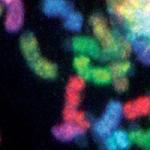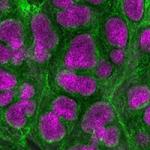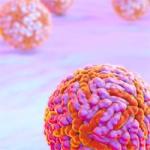
Astrid Desiree Haase, M.D., Ph.D.
Senior Investigator
RNA Biology Section, Laboratory of Cell & Molecular Biology
NIDDK
Research Topics
We aim to understand how small non-coding RNAs guard genomic integrity.
Current Research
Small non-coding RNAs play vital roles in development and disease by regulating gene expression, defending against viruses, and silencing mobile genetic elements (transposons). Our research focuses on PIWI-interacting RNAs (piRNAs), which safeguard genome integrity and are essential for germ cell health and fertility.
To unravel the molecular mechanisms of this RNA-based immune system, we take an interdisciplinary approach that integrates genetics, genomics, and biochemistry. Results from our studies have deepened the understanding of the fundamental processes protecting genome integrity in animals and humans, and hold promise for uncovering molecular strategies for technological and therapeutic advancements.
Applying our Research
Maintaining genome stability is essential for cellular and organismal health, as its disruption is linked to various diseases, including infertility, inflammation, and cancer. Understanding the molecular mechanisms of RNA-guided genome protection holds great promise for advancing fertility treatments and developing innovative biomedical strategies to counteract genomic instability in disease.
Need for Further Study
Small RNA-guided molecular machines are found across all domains of life, yet we are only beginning to understand their diverse roles in gene regulation and genome surveillance. Unraveling the molecular strategies of RNA-guided pathways is essential for elucidating their functions in health and disease. Furthermore, RNA-based mechanisms have already proven effective in biotechnology and targeted therapies, and gaining deeper insights into piRNA pathways will further expand our molecular toolkit for advancing research and therapeutic applications.
Biography
- Senior Investigator (with tenure), NIDDK, NIH, 2023-
- Stadtman Tenure-Track Investigator, NIDDK, NIH, 2015-2023
- Post Doctoral Fellow, Cold Spring Harbor Laboratory, 2007-2015
- Ph.D., University of Basel, Switzerland, 2007; Friedrich Miescher Institute (FMI) for Biomedical Research, 2002-2007
- M.D., University of Vienna, Austria; Institute of Molecular Pathology (IMP), 2000-2002
Selected Publications
- Konstantinidou P, Loubalova Z, Ahrend F, Friman A, Almeida MV, Poulet A, Horvat F, Wang Y, Losert W, Lorenzi H, Svoboda P, Miska EA, van Wolfswinkel JC, Haase AD. A comparative roadmap of PIWI-interacting RNAs across seven species reveals insights into de novo piRNA-precursor formation in mammals. Cell Rep. 2024;43(10):114777.
- Stoyko D, Genzor P, Haase AD. Hierarchical length and sequence preferences establish a single major piRNA 3'-end. iScience. 2022;25(6):104427.
- Meng Q, Stoyko D, Andrews CM, Konstantinidou P, Genzor P, O T, Elchert AR, Benner L, Sobti S, Katz EY, Haase AD. Functional editing of endogenous genes through rapid selection of cell pools (Rapid generation of endogenously tagged genes in Drosophila ovarian somatic sheath cells). Nucleic Acids Res. 2022;50(15):e90.
- Genzor P, Konstantinidou P, Stoyko D, Manzourolajdad A, Marlin Andrews C, Elchert AR, Stathopoulos C, Haase AD. Cellular abundance shapes function in piRNA-guided genome defense. Genome Res. 2021;31(11):2058-2068.
- Stein CB, Genzor P, Mitra S, Elchert AR, Ipsaro JJ, Benner L, Sobti S, Su Y, Hammell M, Joshua-Tor L, Haase AD. Decoding the 5' nucleotide bias of PIWI-interacting RNAs. Nat Commun. 2019;10(1):828.
Related Scientific Focus Areas




Molecular Biology and Biochemistry
View additional Principal Investigators in Molecular Biology and Biochemistry

This page was last updated on Thursday, August 7, 2025